Rachel Maddow: The Rolling Stone Interview - Rolling Stone
Rachel Maddow sprints onto the set of The Rachel Maddow Show, brain on fire, and slides into her chair. It's two minutes before airtime at MSNBC's cavernous New York studio in Rockefeller Center and Maddow, dressed in her standard on-air black blazer and black tank top, Levi's and blue suede Adidas Gazelles stealthily hidden by her giant desk, hunches over her keyboard, pounding out last-minute revisions to her script with the speed of a court reporter. On the agenda this Friday evening in May: the ever-evolving Trump-Russia scandal and the controversial termination of FBI director James Comey, a story that might as well have been concocted to suit Maddow's brand of scathing, methodical deconstruction. She begins the hour on a note of quietly seething moral outrage, opening her monologue with a breakdown of the Comey firing, before moving through all the players in the Trump saga: Michael Flynn, Jeff Sessions, Russian oligarchs, New York's former U.S. attorney Preet Bharara – and ending with a note about a series of investigations taking place in various inspectors-general offices regarding the Trump-Russia matter. They could have a devastating impact on the administration – provided the president lets them continue, Maddow notes: "He's already fired the FBI director. He's already fired Preet Bharara and the other U.S. attorneys. He fired the deputy attorney general. Who do you think he's going to fire next?"
Launched nearly a decade ago, The Rachel Maddow Show, hosted by an openly-gay Rhodes scholar who came to TV news by way of progressive Air America Radio, is now the number-one prime-time news program on cable television. It's a significant though not totally improbable achievement for a show whose mantra, "Increase the amount of useful information in the world," has taken on new resonance in the Trump era, when a single presidential tweet can receive breathless coverage by the mainstream press, and journalism itself is denounced as "fake news." Though Trump's so-far chaotic presidency has helped boost cable ratings across the board, no program has benefited as much as Maddow's, whose audience has almost tripled, from 849,000 nightly viewers in 2014 to more than 2.3 million today, and growing. In mid-May, The Rachel Maddow Show was second only to the NBA playoffs as the most-watched program on cable, period.
In person, Maddow is taller than she appears on TV – a lanky five feet eleven – and also less feminine, her contact lenses replaced by chunky black glasses, mascara wiped off. Maddow's one concession to the female norms of TV news is agreeing to wear makeup, which she does for precisely one hour and 15 minutes per day. Off camera, she dresses in grungy attire, which on an afternoon before Memorial Day means Levi's, a beige T-shirt, a hole-ridden thrift-shop denim shirt, and camouflage Adidas Shell Toes. "They're invisible," she says about her sneakers, though she could be talking about herself. At 44, Maddow is naturally, neutrally pretty, which is a positive if one's aim is to let the words, not the image, make the point. "I have no visual-presentation goals for myself," she says in her office at 30 Rock. A long rack of near-identical dark suit jackets hangs on one wall. "It's on purpose. You line me up with Lawrence O'Donnell and Chris Hayes and Brian Williams, and we've all got a very similar shade of the same haircut."
As is true for many journalists, Maddow's office is sort of a mess, with manila file folders stacked on the floor, and printouts of various stories she's keeping track of piled on her desk and along the windowsill. "This is how I'm going to die one day – crushed under a pile of paper," she says, giving me a quickie tour of her various tchotchkes: the Trout of North America wall calendar that she quickly flips to May (it was still on March); her Vladimir Putin nesting dolls; a G.I. Joe, still in its box; a metal Tabasco tub housing her Emmy, which is lying sideways, a tiny bit of gold orb emerging from the top. On the whiteboard behind Maddow's desk is a running, if haphazardly diagrammed, list of the stories she's thinking about, with the most important circled in blue marker. Perpetual favorites like Flynn and Trump's ex-campaign manager Paul Manafort hold a prominent place. Another name floating in its own blue circle: Viktor Medvedchuk, "a superclose-to-Putin oligarch" whose name recently turned up in intercepts for having had contact with the Trump campaign. "But we haven't talked about the fact that he was [also] one of the first individuals sanctioned by the U.S. government after the Crimea thing," says Maddow. "And so what is that guy doing talking to the Trump campaign during the campaign when he is one of the sanctioned individuals?"
Maddow goes on like this, describing the other stories she finds fascinating, or more specifically, pinpointing the most under-reported, yet possibly important, facet of the stories that interest her, and then drilling down, which can be riveting, as well as exhausting. But that's just how Maddow's brain works. "What's remarkable about Rachel is that she actually is that brilliant," says her senior producer Laura Conaway, who has worked for Maddow since 2009. "The thing about this show is it starts with digesting an enormous amount of information every day, and then basically throwing it all out and saying, 'OK, that's what everybody already knows.' It requires attention, and Rachel is supremely gifted at paying attention."
Maddow's friend and fellow MSNBC host Chris Hayes, who considers her a mentor, compares her to LeBron James. "No one can do what she does," he says. "She is a master of the medium in a way that is just unparalleled – she can figure out how to tell a story and do things she cares about in ways that grab people's attention, without just going to where the attention is. And she does that every night. To produce what she produces every day is kind of incomprehensible to me, actually."

Maddow came to journalism almost by accident. Raised east of San Francisco in suburban Castro Valley, she learned to read using the newspaper – her parents, an attorney and a school administrator, have said she was reading before kindergarten – but grew up in the Bay Area as more of a participant than an observer, playing high school sports and, by her teens, becoming heavily involved in AIDS activism. At Stanford, where Maddow enrolled in 1990, she studied public policy, and then went on to earn her doctorate in politics at the University of Oxford in England. After returning from England in 1998, Maddow moved to western Massachusetts to work on her dissertation, crashing with friends and working any odd job she could find: bucket washer at a local coffee-roasting factory, delivery girl, yard worker, minimum-wage news reader at the local Holyoke radio station. The station held a contest to find a new sidekick for the host of its morning show. Maddow, who'd never worked in media, entered and won. "I stumbled into that job, but it just really clicked," Maddow says. "I liked being in charge of the news. I found I really liked explaining things."
TRMS is nothing if not a lengthy explanation of the news that Maddow is most interested in, particularly the opening segment, or "A Block," which she usually writes herself, sometimes with help from Conaway or other producers. The show's format of deep-dive analysis and investigative reporting is not easy to produce, and a typical day can last anywhere from 12 to 14 hours. Maddow, who lives with her longtime partner, photographer Susan Mikula, in western Massachusetts, maintains an apartment in Manhattan where she lives during the week, making the three-hour-plus drive back and forth to Massachusetts every weekend. Her workday begins at around 11 a.m., when she arrives at her office, reads through every bit of news she can get her hands on, and then spends a few hours researching or reporting what interests her the most. At around 2 p.m., Maddow convenes her staff in the newsroom to plan the evening's show, though, given the volatility of the current news cycle, what seems relevant at 3 p.m. might be sidelined by six.
One afternoon, I sit in on a production meeting with Maddow and about 20 staffers. The news of the day pertains to the president's latest pre-dawn tweet storm, in which Trump mused about canceling White House press briefings, and later hinted that he "might" have secretly recorded his meetings with Comey. Maddow, wearing a brown hoodie, stands in front of a large whiteboard, marker in hand, studying a long list of potential story ideas. She considers the taping issue, which White House spokesman Sean Spicer refuses to comment on: "If Trump says there are tapes and there actually is a taping system, then it's relevant that Spicer has no comment." She looks at her staff. "Who thinks he has a taping system?" Everyone raises a hand.
 Maddow’s high school senior picture. Seth Poppel
Maddow’s high school senior picture. Seth Poppel Why Trump would admit to this is puzzling. Quite possibly, he's just being Trump; on the other hand, as Maddow points out, with the potential obstruction-of-justice issues that secretly taping your FBI director might raise, his comments are worrisome. "It does seem like the president is melting down, like there's something . . . degenerating in his statements," she says. "But it's not our business."
"When is it our business?" asks Maddow's executive producer, Cory Gnazzo.
"When they invoke the 25th Amendment," says Conaway.
A short debate ensues over when, if ever, the show could broach the president's mental fitness. Maddow quickly dismisses it. "Trump has mastered the political media by causing you to lose focus and then re-center on whatever it is he's just said," she tells me later. "But I'm not interested in what the president has to say."
What's your rule about how to cover this administration?
We have a mantra when it comes to this administration: "Don't pay attention to what they say, focus on what they do." And that is very helpful, because it's easier to cover a fast-moving story when you're not distracted by whatever the White House denials are. It's fascinating that H.R. McMaster and Dina Powell and Rex Tillerson, these very impressive people, all came out and denied that the president gave the Russians secret intelligence in the Oval Office. But, then, the next morning the president was like, "Yeah, I did tell the Russians!" So that's a sign to not get too hung up on what the White House is saying at any moment, because even their most credible people are being put forward to lie, bluntly, regularly . . . and it's OK!
Do you marvel at the degree to which the administration just blatantly lies?
I think it's more helpful to take that information, the fact that the White House is putting out nonfactual information on a regular basis, and internalize it. What it means is there is a whole area of information coming from "White House sources" that has no meaningful impact on what I understand to be true about the world. For me, that's helpful in an organizational way.
How do you decide what to cover?
First, you need to be able to synthesize a lot of information, and then exclude from your field of consideration the stuff that isn't important so you can find the salient, new thing. And that is very rarely something overt.
Let's talk about the Russia story. You got on that very early, and stuck with it.
Well, I mean, I'm not keeping it alive for its own sake. There's a lot of scandal associated with this new administration. Some of it is like normal political scandal – like Tom Price trading health stocks while he was in a public position to regulate those stocks. That's a bad scandal, but it's kind of normal political corruption. It's almost quaint. Then, there are Trump-specific scandals, like we now have a ruling family where there's a crowned prince who's an adviser without remit, and we've got unqualified nepotistic appointments and conflicts of interest and Trump not disclosing his taxes. And then there is this third scandal, which is about the existence of this presidency. That's an existential scandal. If this presidency is knowingly the product of a foreign-intelligence operation, that's not Tom Price trading stocks that he was also affecting the price of as a public official, you know? That is a full-stop national crisis. Does that mean Russia makes the air every day, even if nothing appears new? No. But when there is something to say about it, I'm going to report it insistently. And I'm willing to do that even if it bothers people.
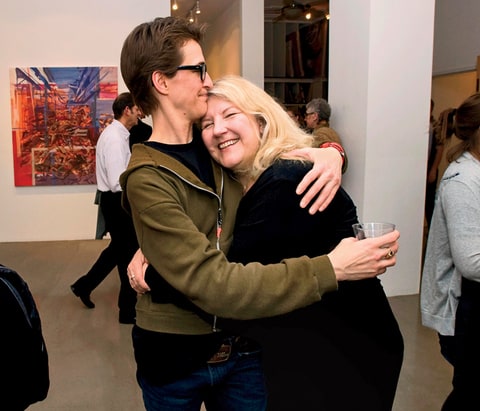 Maddow her partner, the photographer Susan Mikula, in San Francisco. Alamy
Maddow her partner, the photographer Susan Mikula, in San Francisco. Alamy Do you care if you have haters? Sean Hannity called you one of the "worst examples" of the "propaganda press."
Sean Hannity said that? That's nice. I don't play requests. I get to decide what we cover. From the very beginning, I've had a deal with MSNBC that they don't tell me what to cover, what not to cover or how to cover what I cover. I'm not trying to make people happy. I'm trying to do an excellent job telling the stories that I think are important. That's all I can do.
Does it matter to you to be first on a story?
No. I want to matter. When something important is happening, I want people to feel like they should come to me. Sometimes news will break during our hour, and whether or not we're first, we've got to absorb it, figure out that it's important, fact-check it, turn it around, present it to the viewers, and we nail it, and that can be a real source of pride.
Do you think it's possible the Trump campaign had no knowledge of the Russian hacking?
I absolutely believe it's possible. I mean, Russia clearly did this attack, and there's lots of circumstantial evidence that points at lots of unexplained and surreptitious contact between Trump people and Russian people at the time that was happening. But circumstantial evidence is circumstantial evidence. This is a serious thing that needs to be chased down to the end.
It's hard to chase Trump down – he's like an escaped electron.
Exactly – irradiating everything he bumps into. That's a pretty good analogy.
How did you manage the shock of election night?
It's funny – if you look at right-wing social media there's this whole thing about how I had a meltdown on election night and cried. And they found tape of me talking about a totally unrelated story months earlier and said that that was me on election night. But I was actually pretty calm that night, and the reason I was pretty calm is because there's a lot to do. I'm not a good ad-libber, and anchoring election night is five, six, seven, eight hours of ad-libbing, which for me is like juggling seven tennis balls while merging onto the freeway at night in the rain with no wipers and no lights. So, no, I had no feelings on election night.
What about the morning after?
I had the same shock as everybody, but we had to get back on the air. And that's a very constructive place to be, because my job is to explain what's going on, what's important and whether there are factual and historically analogous things that might help you connect and understand the import of what's happening. If I'm waylaid by being upset or angry, that doesn't help me explain what's happening.
Do you have to work hard to contain those emotions?
I'm not having an emotional reaction to the news. I'm really not. It's like if you're a surgeon who's removing brain tumors. While you're doing the surgery, do you feel sad for the person having gotten the tumor? No, you're working on taking care of the tumor and fixing it.
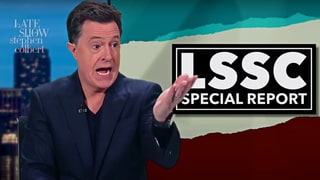
Because tumors can be deadly if you don't get rid of them, which is not unlike how some people see the state of our country right now. . .
People feel overwhelmed when they feel like they can't do anything about it. I can do something about it! While we're having this incredibly scandalous presidency, and the result of this foreign attack that had this big effect on our country, I get to come to work every day and make sense of it and explain it and find out new information about it, and put that out in the world. I feel like I'm doing work that's needed. That feels good.
How collaborative is your process?
It takes a village. I mean, there are individual segments, and particularly A Blocks, that I will just go into the silo and produce on my own, but you can't do that for the whole show. You can't write 8,000 words a day on your own. There are definitely segments that are almost wholly born from producers, and I really count on them.
Do you see yourself as the captain of the ship?
Oh, I'm not a captain – I mean, if I was a parent, the children would starve, you know? Like, I can't really deal with hirings and firings and vacations and birthdays and keeping people happy. I'm blessed with producers who are really good with humans. . . . I'm not great at that. I focus entirely on editorial content.
Do you ever find it frustrating that Trump's supporters just don't seem to care about any of these scandals?
I don't think much about how the news is received, or whether or not it is moving people. The news is the news, whether or not people are feeling it. The scandals of the Trump administration, I'd argue, are the most serious scandals that any president has ever faced, not even just since Nixon.
In the early days of Watergate, about half the country didn't pay much attention – it was only when people started going to jail that it resonated.
If the Trump scandals prove to be as bad as they might be and what the FBI is investigating turns out to be worst-case scenario – guilty, did it – then I think the American people as a whole will respond to that appropriately, by recognizing this as an unprecedented, and remarkably successful, foreign attack on the foundations of our country. Will there be outliers? Yes. But I think, in general, if this thing proves out – and it might not – the country will react the way you would hope we would.
That is a very optimistic way to look at the seemingly intractable partisan divisions in our country.
The American people are more patriotic than partisan when it gets to the end of the day. It's true that we're tribal and partisan and petty and all of those things, but there is also a pride and awareness of what it means to be the kind of country we are, which is unlike any other country on Earth, and I think that will bear out.
I was surprised to hear you don't see yourself as partisan when a lot of people would disagree. How do you defend that?
Oh, I'm a liberal for sure. I'm just not a candidate person. And I'm not a huge fan of the Democratic Party. I'm also less interested in the Democratic Party as a topic – the Republican Party is more fascinating to me.
What about the Republican Party fascinates you?
I'm like a sociological student of the Republican Party – even absent Trump. There is a robust, well-funded, decades-old, superorganized, focused, competent conservative movement that exists outside the Republican Party that yanks the party's chain whenever they want to. The Republican Party is like an old burned-out husk of a Ford Pinto that blew up 'cause its gas tank was in the wrong place, but it's attached to a giant jet engine. The Democratic Party is like a Honda Civic. It putters through the world in a predictable way, and you like it or not depending on if you find small, unpowerful things cute. But the Republican Party has this incredible propulsion and no way to steer it.
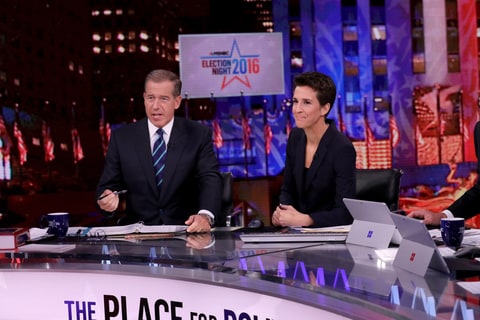 "I had no feelings on election night," says Maddow, shown here hosting election coverage with Brian Williams. Heidi Gutman/MSNBC/NBCU/Getty
"I had no feelings on election night," says Maddow, shown here hosting election coverage with Brian Williams. Heidi Gutman/MSNBC/NBCU/Getty You had a collegial relationship with Roger Ailes, who helped create this toxic political environment we're in. What made you seek him out?
I wasn't seeking help from him on how to "create a toxic political environment," I was looking for help on my camera angles! But I don't want to talk about the technical advice he gave me, because I consider it to be both a gift and also proprietary – like, I use it, I don't want anybody else to use it. It was a nice thing that he did for me, and it's been very valuable – it helped me get an advantage over my competitors.
Was it hard for you to reconcile the Ailes you knew with the Ailes who was accused of serial sexual harassment?
It was just never my experience of him. I knew him in a very specific context. I've never been in his office. I've never seen him interact with his staff. I only ever saw him in public. We'd meet and have breakfast. I'm horrified by the allegations against him, and I am appreciative of how serious Fox must have found them to be in order to fire him. But I didn't know anything about it. I was never in touch with Roger after those allegations became public.
Did you ever try?
It's funny, the last time that we had any communication was within 48 hours of that story breaking with the allegations. I'd sent him a note saying that I wanted to see him. Nothing urgent, just let's put a date on the calendar. After the story broke, I remember thinking, "I wonder if he'll ask me to vouch for him or something." But I never heard from him again.
Your not having any idea is a bit hard to swallow, when there were stories for years about how he dealt with women. Unless he treated you more like a guy?
Yeah, I'm not that female. I've been an out lesbian since I was a teenager. I look like a dude. I'm totally comfortable with that. I am not trying to be on TV because I like the way I look on TV or because I love the glamour.
Though I vaguely remember seeing you on Tucker Carlson's show with longer hair and a pink jacket.
That wasn't me, dude. That was them. When I first started at MSNBC, they had this poor person whose job it was to dress the talent, and she tried to turn me into a person who looks the way they're supposed to look on television. Can you imagine?
Still, I'm curious if being a woman in this business resonates for you.
Look, this business is very, very, very male. It's great that one outcome of the Fox turmoil is that they've apparently got a woman who's taken [some part of] Bill Shine's job – the top executive job there. You don't see that here. You don't see that at CNN.
Why do you think some Americans hate and distrust the media so much?
It's a convenient foil. I don't really care. I am a cheerleader for the American media and I feel like the free press is going to be what saves us from the political crisis that we are in. We just need to keep doing what we're doing.
What do you think we could do better?
I think the media needs to be protective in terms of its business model. There needs to be a remunerative vocation, which is called reporter, which is called editor, which is called publisher.... We need to do what we can to make sure that we defend people that are attacked for doing that work, and [also] that there are journalism jobs that pay above minimum wage so we get good people doing this work.
Amen.
Right? I mean, news doesn't just happen – people need to appreciate that news comes from people digging it up and that journalism is a noble thing, and we've got to cheer for it when it succeeds.
A lot of people criticized the way you reported on Trump's tax return [summary pages of which were first uncovered by David Cay Johnston of DCReport.org]. Do you think that's fair?
I had two pages of Donald Trump's tax returns from 2005. For me, it was very important that I made sure they were real and I wasn't getting punked, and then that I put them out there in the world in a way that I felt explained their importance. That's what I do with the news every day. I find something, figure out if it's true, figure out what I think is important about it and then explain what I think is important about it. And I try to be accurate and insightful.
But what people latched onto was that it was promoted on Twitter in a way that led people to believe it was going to be a bigger deal than it was.
There were two tweets. I can't even quote it directly, but it's like, "Breaking: We have Trump tax returns. Seriously." Then I followed that up with, "We have the 1040 form from 2005." And then I got on the air and said, "We've got these two pages. This is the 1040 form from 2005. This is how we got them. This is why we believe they are real. I've got the reporter here who got them and here's why it's important that the first-ever known authenticated Donald Trump federal tax returns are now in the public domain."
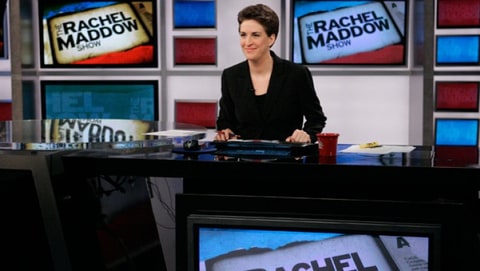 "I'm rarely satisfied – I mostly would grade myself below a C for any particular show," says Maddow, whose show often ranks number one for nightly cable news. MSNBC
"I'm rarely satisfied – I mostly would grade myself below a C for any particular show," says Maddow, whose show often ranks number one for nightly cable news. MSNBC Do you feel like you oversold it, though?
I felt like I did exactly what I wanted to do. You can't really do any worthwhile work if you're hoping for a specific response from people. This is what I do and some people like it and some people don't, and some days you're up and some days you're down in terms of whether people think you're a good person or a bad person.
Are you generally happy with your performance?
Oh, I'm rarely satisfied – I mostly would grade myself below a C for any particular show, as our average.
Below a C?
Well, I mean, we have technical failures. Sometimes we have boring guests. Sometimes I do a lousy job in an interview. Just sloppiness, in writing, bad editing, typos sometimes screw shit up. But occasionally, we do shows that I think are really good – I'm not blind to when we do a good job.
What's your metric for doing a good job?
Whether I got it right and whether or not I've advanced the story. And every once in a while you see your influence in the world. You see people grasp a story that you've broken or a point that you have been able to introduce into the dialogue around something. But again, you can't aim at it. All you can try to do is get the work right.
What would you say is your biggest deficit on TV?
I don't think I'm a very good interviewer. In general, that's not my skill. Sometimes we've brought on a person because they really have a thing to add, and then I just don't ask them the thing that elucidates the thing that we brought them on the air for. That makes me crazy.
Who do you see as a great interviewer?
You know who I think is amazing? Chris Matthews. And I know that sounds weird, because he's famous for interrupting people. But he interrupts people because he's listening so hard to them. He knows where people are going and he jumps in to get more out of them. The times I've seen Chris interview Trump were the most illuminating interviews with him I've ever seen, because he was able to draw more stuff out of Trump than anyone else.
I don't see you as someone who is even interested in that method – people come on your show to have a conversation.
Right! I have a tacit contract with my viewers that if I invite somebody onto my show it's because I believe they have something you ought to hear. But that genteel kind of kid-glove handling of my guests isn't as extractive as it could be. I'm glad there are a lot of different types of people who do this job. The way I do it is not for everybody.
Have you found the whole fake-news and "alternative facts" stuff to be a distraction?
I mean, who cares? It's like sticks and stones. I am interested in the president denigrating the press – and the judiciary and the intelligence community and law enforcement – because that is important in terms of his behavior as an increasingly authoritarian-style leader, the type of which we have never had before at this level of American politics, period. I am not interested in it because it offends me. When speech becomes behavior, then it is relevant. I don't watch the press briefing. I don't read the president's tweets. In general, "The president has tweeted X" is an overblown story.
What was the thing that surprised you most about working in TV?
Just how much smoke-blowing there is – a lot of people saying, "Wow! That was so awesome," when you're like, "Are you sure?"
You also get a lot of people who believe that they're great, when they kind of suck.
I'm always aware of all the ways that failure can creep into everything I'm doing. I'm constantly battling in order to achieve something that I'm not embarrassed by, which people think is self-deprecating, but it's fucking motivating.
And also tiring?
It's really tiring. I have the best staff in news, but it's hard to keep people for the long haul. Our work tempo is so exhausting. It's just hard.
Can you ever unplug?
I threw my back out, so I unplug less than I used to. There are three things I do to stay sane: I exercise, I sleep – I'm a good sleeper – and I fish. I cannot do any of those things with this back injury.
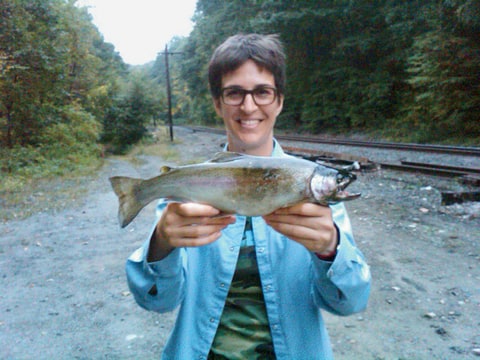 There are three things I do to stay sane," says Maddow. "I exercise, I sleep and I fish." Courtesy of Maddowblog
There are three things I do to stay sane," says Maddow. "I exercise, I sleep and I fish." Courtesy of Maddowblog Even fishing?
I mean, like, I can – I went out last weekend with a friend of mine who blew out her knee the day after I hurt my back. Usually, we're, like, out there in the river and rappelling down gorges and doing crazy stuff. Now, there's the two of us in folding chairs, fishing for shad in the Connecticut River. It was so sad.
Aside from your passion for fishing, is there a side to you that we don't see on TV?
What do you think?
I think you're essentially a private person who prefers to reveal a part of yourself.
Yeah. I'm not pretending to be somebody that I'm not on television. But there's a slice of me that I put on television.
How big of a slice?
Do any of us know the extent of who we are?
Onscreen, you seem pretty authentic.
I try to at least give some cue that I'm giving you my own personal take on this now. But I don't yell. I'm not gonna pound the table and wave my fist in the air. That's not going to help.
Sign up for our newsletter to receive breaking news directly in your inbox.
Please enable javascript to sign up for the newsletter.
Ranked on a scale from 1 to 10, the trending score reflects the number of users reading a story in real time.What is this?